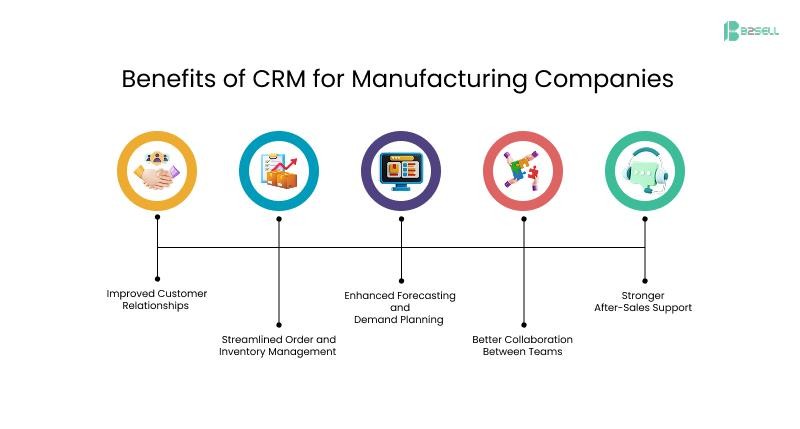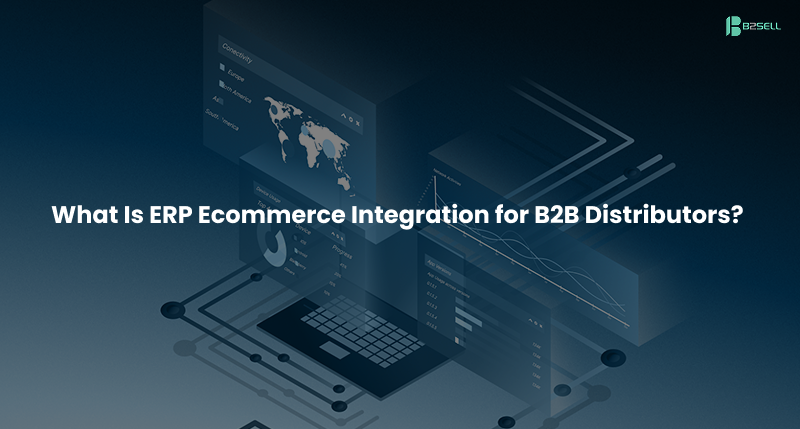Introduction: Why CRM is Essential for the Manufacturing Industry
The manufacturing industry is driving change at the forefront of global transformation. With growing competition, evolving customer demands, complex supply chains, and the need for real-time data, manufacturers can no longer rely on outdated systems or spreadsheets to manage relationships. In today’s digital-first world, delivering seamless customer experiences, streamlining operations, and accurately forecasting demand are mission-critical.
This is where CRM for manufacturing industry comes in. Customer Relationship Management (CRM) software is no longer just a sales tool—it’s a strategic asset for manufacturers. It helps streamline order management, improve supply chain visibility, enhance after-sales service, and strengthen relationships with distributors, suppliers, and end customers.
In this guide, we’ll explore the top 10 CRM for manufacturing companies while also diving into the benefits, features, and future trends of CRM in manufacturing. By the end, you’ll have a clear understanding of what to look for in the best CRM for the manufacturing industry—and how integrations like B2Sell can elevate your business to the next level.
What is CRM for the Manufacturing Industry?
A CRM for manufacturing industry is specialized software that helps manufacturers track customer data, manage distributor and supplier relationships, monitor sales pipelines, and deliver post-sale support. Unlike generic CRM platforms, manufacturing-focused CRMs integrate with ERP, supply chain, and production systems, ensuring a 360-degree view of business operations.
Key Features of CRM Software for Manufacturing Industry
- Sales and Distributor Management – Track orders, pricing, and negotiations.
- Customer Service & After-Sales Support – Manage warranties, repairs, and service schedules.
- Supply Chain Visibility – Real-time insights into raw material availability and production timelines.
- Integration with ERP and PIM – Seamless data sharing across departments.
- Demand Forecasting – Predict future sales and production needs using analytics.
Benefits of CRM for Manufacturing Companies
Why should manufacturers invest in the best CRM for manufacturing business? Let’s break down the key benefits:

1. Improved Customer Relationships
Manufacturers often deal with distributors, wholesalers, and direct customers. A CRM centralizes all communication, helping sales teams track conversations, resolve issues, and provide better customer service.
2. Streamlined Order and Inventory Management
CRM software for manufacturing bridges the gap between sales and production, ensuring smoother operations. This ensures that orders flow smoothly, production schedules are aligned, and customers get real-time updates.
3. Enhanced Forecasting and Demand Planning
CRMs analyze historical sales data to forecast demand, minimize waste, and optimize inventory management.
4. Better Collaboration Between Teams
Manufacturers deal with complex workflows involving engineering, production, procurement, and sales. CRM provides a centralized platform that enables seamless collaboration across all teams.
5. Stronger After-Sales Support
From warranty claims to spare part replacements, CRM systems for manufacturing make after-sales service easier and more efficient.
How to Choose the Best CRM for Manufacturing Industry
When evaluating CRM solutions, here’s what manufacturing businesses should consider:
- Industry-Specific Features: The CRM should be designed to handle complex supply chains, distributor management, and long B2B sales cycles.
- Scalability: It must be capable of supporting business growth and adapting as operations expand into new markets or product lines.
- Integration Capabilities: A strong CRM should seamlessly integrate with ERP, PIM, and eCommerce systems to create a connected digital ecosystem.
- User-Friendly Interface: Adoption across departments becomes easier when the CRM is intuitive and simple to use, reducing training time and resistance.
- Analytics and AI: Advanced forecasting, sales insights, and customer behavior analysis are essential for data-driven decision-making and improved customer relationships.
Top 10 Best CRM Software for Manufacturing Units in 2025
Here’s a detailed roundup of the top 10 CRM software solutions for manufacturing in 2025.

1. Salesforce Manufacturing Cloud
Overview: Salesforce remains the global leader in CRM, and its Manufacturing Cloud edition is specifically built for manufacturers. It connects sales, operations, and partners into a single ecosystem.
Key Features:
- AI-powered forecasting for demand and revenue
- Partner relationship management for distributors and dealers
- Seamless ERP and supply chain integration
- Advanced analytics with real-time dashboards
Pros:
✔ Extremely scalable for large enterprises
✔ Strong AI capabilities through Salesforce Einstein
✔ Huge marketplace of third-party apps
Cons:
✘ Higher learning curve and implementation cost
✘ May be overkill for smaller manufacturers
Best For: Enterprise manufacturers managing global operations and intricate supply chains.
2. Microsoft Dynamics 365 for Manufacturing
Overview: Microsoft’s Dynamics 365 combines CRM and ERP capabilities, making it a powerhouse for manufacturers who need a connected ecosystem.
Key Features:
- Unified CRM + ERP for manufacturing workflows
- Predictive maintenance powered by AI and IoT
- Native integration with Microsoft Teams and Office 365
- Advanced reporting and financial management
Pros:
✔ Deep integration with Microsoft ecosystem
✔ Strong ERP-CRM combination
✔ Highly customizable
Cons:
✘ Licensing can get expensive
✘ Requires skilled resources for customization
Best For: Mid-to-large manufacturers seeking ERP + CRM on one platform.
3. HubSpot CRM for Manufacturing
Overview: Known for its simplicity and affordability, HubSpot is one of the best CRM for small manufacturing business operations.
Key Features:
- Free version available with core CRM features
- Sales pipeline management
- Email and marketing automation
- Customer service ticketing system
Pros:
✔ Easy to use and quick to deploy
✔ Affordable pricing structure
✔ Excellent for inbound marketing
Cons:
✘ Limited customization compared to enterprise CRMs
✘ May lack advanced manufacturing-specific features
Best For: Small manufacturers or startups wanting an affordable, easy-to-use CRM.
4. Zoho CRM for Manufacturing Industry
Overview: Zoho CRM is highly flexible and cost-effective, making it popular among SMB manufacturers worldwide.
Key Features:
- Inventory and order management tools
- Omnichannel customer engagement (email, phone, social)
- Workflow automation with AI-driven insights
- Integration with Zoho’s ERP and Finance suite
Pros:
✔ Budget-friendly for SMBs
✔ High customization capabilities
✔ AI assistant “Zia” for insights
Cons:
✘ Can feel overwhelming due to multiple features
✘ Limited large-enterprise scalability
Best For: Growing manufacturers with small-to-mid teams that need affordability + flexibility.
5. Pipedrive CRM for Manufacturing Companies
Overview: Pipedrive is a sales-focused CRM with visual pipeline management, ideal for manufacturers who want to optimize their sales cycles.
Key Features:
- Visual deal pipeline tracking
- Workflow automation and reminders
- Sales forecasting and goal tracking
- Easy integration with third-party apps
Pros:
✔ Intuitive and user-friendly
✔ Great for sales-driven manufacturing units
✔ Quick onboarding
Cons:
✘ Lacks advanced ERP or manufacturing-specific modules
✘ Limited reporting depth
Best For: Manufacturers with a strong sales team needing pipeline management rather than complex CRM.
6. NetSuite CRM (by Oracle)
Overview: NetSuite CRM is part of the Oracle NetSuite ERP ecosystem, offering end-to-end visibility across manufacturing operations.
Key Features:
- Real-time customer lifecycle management
- Native ERP integration
- Built-in order and inventory management
- Automated workflows for supply chain
Pros:
✔ Excellent for ERP-driven manufacturing businesses
✔ End-to-end process visibility
✔ Strong financial and inventory management
Cons:
✘ Expensive for smaller businesses
✘ Implementation can be complex
Best For: Enterprise manufacturers that want full ERP + CRM + supply chain integration in one suite.
7. SAP CRM for Manufacturing Business
Overview: SAP is a leader in ERP, and its CRM offering integrates deeply with supply chain and manufacturing operations.
Key Features:
- Advanced demand planning and forecasting
- Global supply chain management
- Built-in analytics and AI insights
- Integration with SAP ERP and SAP HANA
Pros:
✔ Excellent for multinational manufacturers
✔ Advanced AI and predictive analytics
✔ Unmatched ERP integration
Cons:
✘ Very high cost
✘ Complex implementation requiring expertise
Best For: Global manufacturers with complex supply chains and high budgets.
8. Creatio CRM for Manufacturing
Overview: Creatio (formerly bpm’online) is a low-code platform that allows manufacturers to build workflows tailored to their operations.
Key Features:
- Drag-and-drop process customization
- Strong workflow automation tools
- Sales, marketing, and service modules
- API-first integration approach
Pros:
✔ Customizable for any manufacturing workflow
✔ Low-code means less dependence on developers
✔ Great for mid-size manufacturers
Cons:
✘ Not as well-known as Salesforce or SAP
✘ May require IT involvement for complex integrations
Best For: Manufacturers that need flexible CRM workflows and custom processes.
9. Freshsales CRM (by Freshworks)
Overview: Freshsales is modern, affordable, and AI-driven—making it a great fit for growing manufacturers.
Key Features:
- AI-based lead scoring and insights
- Built-in phone, chat, and email tools
- Sales pipeline and workflow automation
- Intuitive mobile app for field sales reps
Pros:
✔ Affordable and scalable
✔ AI-driven insights without complexity
✔ Easy integration with other Freshworks apps
Cons:
✘ Less advanced than enterprise CRMs
✘ Limited advanced reporting
Best For: Growing manufacturers that want a cost-effective, modern CRM.
10. Odoo CRM for Manufacturing Industry
Overview: Odoo is an open-source ERP and CRM platform that’s modular, flexible, and cost-efficient for manufacturers.
Key Features:
- CRM module integrates with Odoo ERP
- Inventory, supply chain, and production modules
- Open-source with full customization
- Strong community and developer support
Pros:
✔ Extremely cost-effective
✔ Modular (choose only what you need)
✔ Strong ERP and CRM combination
Cons:
✘ Requires technical expertise for setup
✘ Fewer out-of-the-box integrations than big players
Best For: Manufacturers seeking a customizable, open-source CRM with ERP integration at a low cost.
FAQ
Which CRM is ideal for small manufacturing businesses?
For small manufacturers, Zoho CRM and HubSpot CRM are excellent choices due to affordability, ease of use, and scalability.
How does CRM software help in the manufacturing industry?
CRM software helps manufacturers streamline sales, manage customer relationships, align supply chains, and improve demand forecasting, leading to higher efficiency and customer satisfaction.
Which CRM integrates best with ERP for manufacturing companies?
Microsoft Dynamics 365, Oracle NetSuite, and SAP CX are ideal because they combine ERP and CRM capabilities seamlessly.
Future of CRM in the Manufacturing Industry
The future of CRM for manufacturing industry lies in AI, IoT, and predictive analytics. Manufacturers will increasingly rely on:
- AI-driven Demand Forecasting
- Predictive Maintenance through IoT Integration
- Omnichannel Customer Experience
- Deeper ERP, PIM, and Ecommerce Integrations
These advancements will make CRM an indispensable part of digital manufacturing strategies.
Why B2Sell Integrations are the Game-Changer for Manufacturers
While choosing the best CRM for manufacturing, integration is the key to unlocking its full potential. This is where B2Sell Integrations make a difference.
B2Sell specializes in integrating CRM with ERP, PIM, and ecommerce systems. For manufacturers, this means:
- Seamless Data Flow – Sync customer, product, and order data across systems.
- Operational Efficiency – Reduce manual work by automating workflows.
- Better Customer Experience – Deliver accurate, real-time updates to distributors and customers.
- Scalable Integrations – Support for small manufacturers to enterprise-level businesses.
By connecting your chosen CRM with B2Sell, you ensure that sales, production, and customer data are always in sync—driving efficiency, loyalty, and growth.
Conclusion
The CRM for manufacturing industry is no longer optional—it’s essential. From managing complex distributor networks to improving demand forecasting and ensuring customer satisfaction, CRM systems are redefining the way manufacturers operate.
Selecting the right CRM for manufacturing companies depends on factors like business size, workflow complexity, and integration requirements. Whether you’re a small manufacturer exploring HubSpot or Zoho, or a global enterprise leveraging Salesforce or SAP, the right CRM will empower you to achieve growth.
With B2Sell Integrations, manufacturers can unlock the full potential of their CRM investment—ensuring smooth operations, accurate data, and exceptional customer experiences.
If you’re ready to transform your manufacturing business with CRM and seamless integrations, B2Sell is your trusted partner.


.png)




.png)